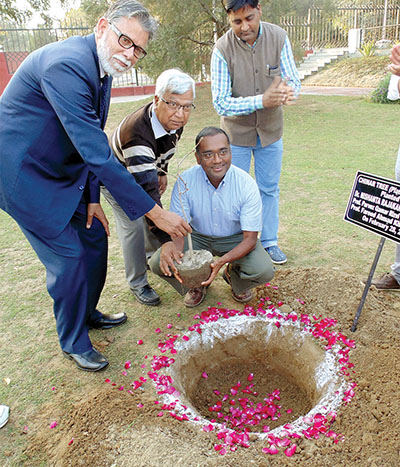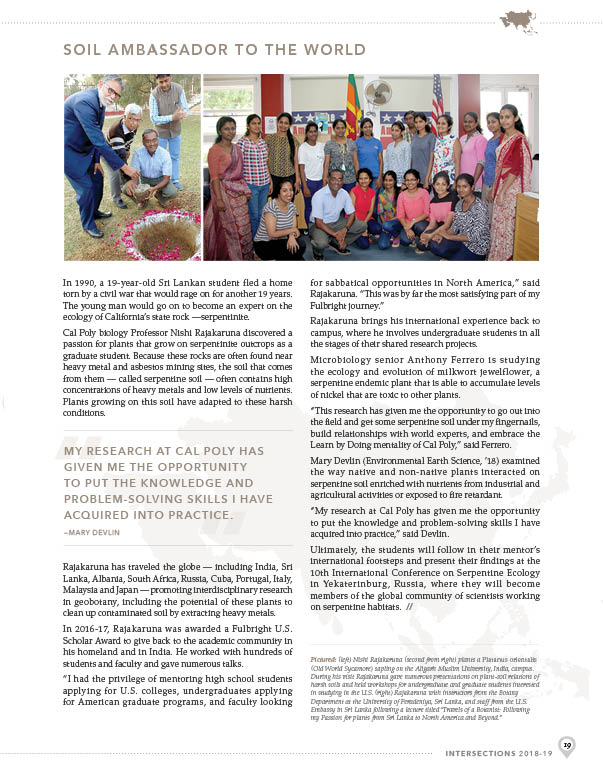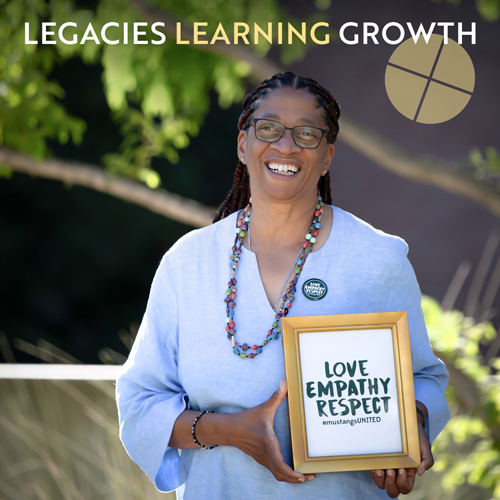Soil Ambassador To The World

Rajakaruna with instructors from the Botany Department at the University of Peradeniya, Sri Lanka, and staff from the U.S. Embassy in Sri Lanka following a lecture titled “Travels of a Botanist: Following my Passion for plants from Sri Lanka to North America and Beyond.”
In 1990, a 19-year-old Sri Lankan student fled a home torn by a civil war that would rage on for another 19 years. The young man would go on to become an expert on the ecology of California’s state rock —serpentinite.
Cal Poly biology Professor Nishi Rajakaruna discovered a passion for plants that grow on serpentinite outcrops as a graduate student. Because these rocks are often found near heavy metal and asbestos mining sites, the soil that comes from them — called serpentine soil — often contains high concentrations of heavy metals and low levels of nutrients. Plants growing on this soil have adapted to these harsh conditions.
MY RESEARCH AT CAL POLY HAS GIVEN ME THE OPPORTUNITY TO PUT THE KNOWLEDGE AND PROBLEM-SOLVING SKILLS I HAVE ACQUIRED INTO PRACTICE.
—MARY DEVLIN
Rajakaruna has traveled the globe — including India, Sri Lanka, Albania, South Africa, Russia, Cuba, Portugal, Italy, Malaysia and Japan — promoting interdisciplinary research in geobotany, including the potential of these plants to clean up contaminated soil by extracting heavy metals.
In 2016-17, Rajakaruna was awarded a Fulbright U.S. Scholar Award to give back to the academic community in his homeland and in India. He worked with hundreds of students and faculty and gave numerous talks.
“I had the privilege of mentoring high school students applying for U.S. colleges, undergraduates applying for American graduate programs, and faculty looking for sabbatical opportunities in North America,” said Rajakaruna. “This was by far the most satisfying part of my Fulbright journey.”
Rajakaruna brings his international experience back to campus, where he involves undergraduate students in all the stages of their shared research projects.

Nishi Rajakaruna (second from right) plants
a Platanus orientalis (Old World Sycamore)
sapling on the Aligarh Muslim University,
India, campus. During his visit Rajakaruna
gave numerous presentations on plant-soil
relations of harsh soils and held workshops
for undergraduate and graduate students
interested in studying in the U.S.
Microbiology senior Anthony Ferrero is studying the ecology and evolution of milkwort jewelflower, a serpentine endemic plant that is able to accumulate levels of nickel that are toxic to other plants.
“This research has given me the opportunity to go out into the field and get some serpentine soil under my fingernails, build relationships with world experts, and embrace the Learn by Doing mentality of Cal Poly,” said Ferrero.
Mary Devlin (Environmental Earth Science, ’18) examined the way native and non-native plants interacted on serpentine soil enriched with nutrients from industrial and agricultural activities or exposed to fire retardant.
“My research at Cal Poly has given me the opportunity to put the knowledge and problem-solving skills I have acquired into practice,” said Devlin.
Ultimately, the students will follow in their mentor’s international footsteps and present their findings at the 10th International Conference on Serpentine Ecology in Yekaterinburg, Russia, where they will become members of the global community of scientists working on serpentine habitats.
Read more about Cal Poly in Asia





